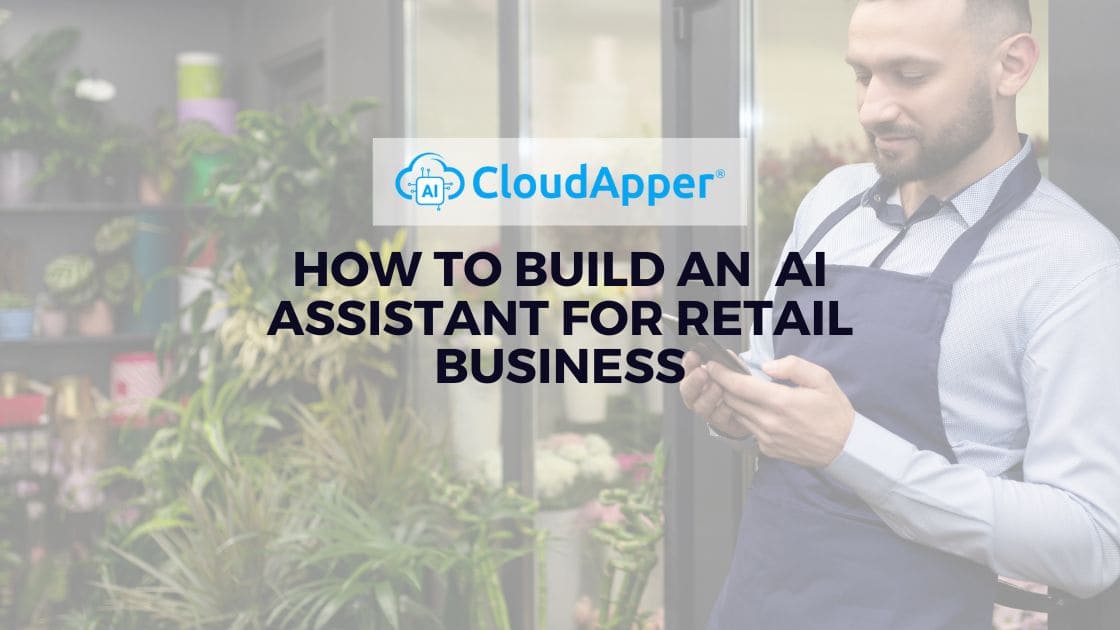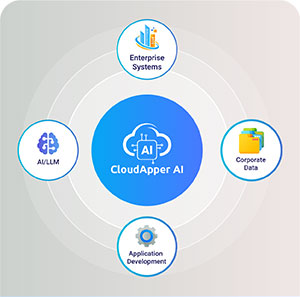CloudApper AI transforms retail with AI assistants, enhancing customer engagement, streamlining operations, and providing personalized recommendations. Learn the step-by-step guide to build AI assistants with CloudApper AI, unlocking benefits for retailers and customers. The future of retail thrives on AI innovation.
Table of Contents
The key to survival in the ever-changing retail industry is a focus on what customers want. The retail industry has been revolutionized by the introduction of AI assistants, which provide customers with a more tailored and streamlined shopping experience while also saving businesses time and money. In this detailed tutorial, we’ll look at how the CloudApper AI platform can be used to create an AI assistant for a retail enterprise AI solution, as well as discuss the advantages that AI assistants provide to both retailers and customers.
The Role of AI Assistants in Retail Sector
The use of AI assistants is changing the way businesses interact with customers and how they run their operations. By recommending items according to a shopper’s preferences and after sales, these virtual assistants enhance the shopping experience. Artificial intelligence assistants help firms save time and effort by automating mundane tasks like updating inventories in real-time and answering commonly requested inquiries. This frees up personnel to focus on more strategic activities. In addition, companies may maximize sales opportunities with the use of AI-enabled cross-selling and upselling in CRM systems, which helps to raise revenue.

Artificial intelligence assistants are changing the retail landscape with their 24/7 availability, quick customer service, and easy integration into existing corporate systems. They enhance customer happiness, streamline operations, and give important data-driven insights for informed decision making. As time goes on and technology improves, AI assistants will play an increasingly crucial role in the retail industry’s future.
Building an AI Assistant with CloudApper AI
1. Initiating the Process
Contacting CloudApper’s solution professionals is the first step in creating an AI assistant for a retail organization. Retailers and these specialists work together to identify and meet each business’s distinctive needs and goals.
2. Model Tuning and Privacy Arrangements
The AI model is fine-tuned by CloudApper’s AI professionals to meet the needs of the retail industry. Safeguards are in place to protect the privacy of sensitive company information.
3. Automating Data Training
To train the AI/LLM automatically, the next step is to import company data in the form of Rich Text, PDF, DOCX, XLS or website URL into the CloudApper AI/LLM trainer. This procedure improves the AI assistant’s knowledge of the retail setting and the interactions between the firm and its customers.
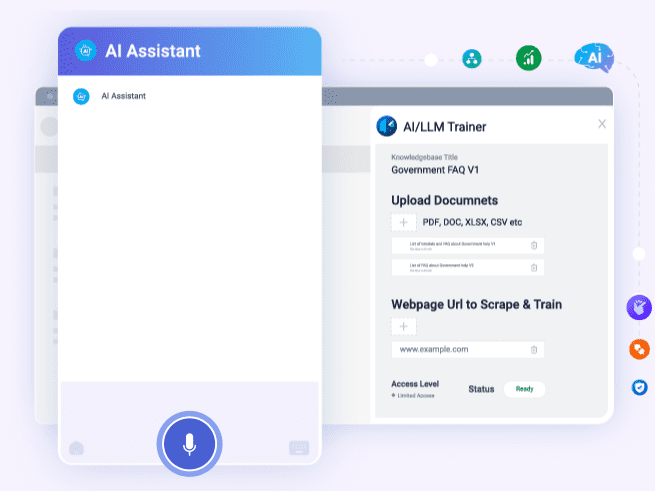
4. User Experience Design
With CloudApper AI’s drag-and-drop designer, designing the user experience is a breeze. The AI assistant’s user interface is highly adaptable, allowing stores to easily tailor it to their own needs and those of their customers.
5. Instant Deployment
With the data learned and the user experience developed, CloudApper AI’s platform quickly produces the AI assistant. A store may immediately put this ready-to-deploy helper to work for them by inserting a single line of HTML code onto their website.
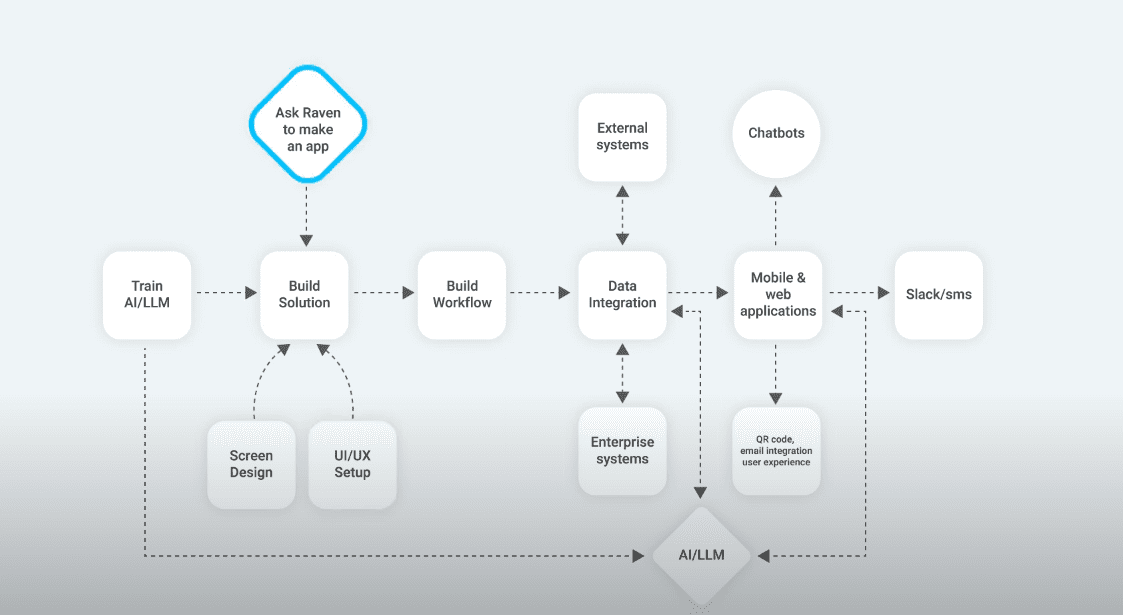
6. Versatility in Application
Using CloudApper AI, retailers can quickly create full-fledged apps that respond to a wide range of consumer questions, streamline processes, and make it easier for customers to submit requests. The AI assistant may be easily connected using APIs into enterprise systems, turning it into a crucial element of business operations.
Benefits of Building an AI Assistant for Retailers
1. Improved Customer Engagement:
By making specific product suggestions and responding quickly to shoppers’ inquiries, AI assistants play a crucial role in boosting engagement. The improvement of the retail experience as a whole helps strengthen the bond between stores and their consumers.

2. Cross-selling and Upselling Opportunities:
Artificially intelligent helpers may now provide product suggestions based on a customer’s past purchases thanks to CRM integration. This method of deliberate upselling and cross-selling helps increase sales and profits.
3. Cost and Time Savings:
Retailers may save a lot of money and time by automating service-related operations like responding to frequently asked inquiries (FAQs) and giving product information. This frees up time for customer care agents to address more in-depth issues and raise the bar for everyone they help.
4. Streamlined Buying Process via Inventory Management:
Artificial intelligence assistants may be easily integrated into inventory systems to provide real-time stock counts. By immediately informing consumers about product availability in response to their inquiries, the assistant speeds up the purchasing process and cuts down on client wait times.

Benefits of Building an AI Assistant for Retail Customers
1. Personalized Recommendations:
Using data collected from each customer’s past purchases and personal preferences, AI assistants provide specific suggestions. Customer satisfaction rises as a result of the improved product fit made possible by the customization.
2. Convenient Shopping Experience:
AI assistants streamline the checkout process and highlight related goods as they lead customers through their shopping trip. AI helpers’ efficiency makes going to the store a pleasure rather than a chore.

3. 24/7 Availability:
Customers have the freedom to shop whenever it’s most convenient for them thanks to the availability of AI helpers. This round-the-clock accessibility serves the varying needs of today’s consumers.
4. Responsive Customer Service:
With the help of AI, customer care can be provided with lightning speed, and problems can be solved more quickly. Improved client satisfaction and loyalty is a result of this instantaneous support.

Conclusion
Businesses that want to remain competitive in the current retail landscape and fulfill the changing expectations of today’s consumers must deploy AI assistants. When it comes to boosting consumer interaction, streamlining operations, and increasing income, CloudApper AI’s platform emerges as a crucial ally for businesses.
Merchants can tap into the game-changing potential of AI to deliver more customized, convenient, and responsive shopping experiences by first learning about the benefits for both merchants and consumers, and then following the detailed instructions for building an AI assistant using CloudApper AI. The future of retail is firmly entwined with AI, and CloudApper AI sits at the vanguard, helping retailers to navigate this revolutionary path with confidence and inventiveness.
What is CloudApper AI Platform?
CloudApper AI is an advanced platform that enables organizations to integrate AI into their existing enterprise systems effortlessly, without the need for technical expertise, costly development, or upgrading the underlying infrastructure. By transforming legacy systems into AI-capable solutions, CloudApper allows companies to harness the power of Generative AI quickly and efficiently. This approach has been successfully implemented with leading systems like UKG, Workday, Oracle, Paradox, Amazon AWS Bedrock and can be applied across various industries, helping businesses enhance productivity, automate processes, and gain deeper insights without the usual complexities. With CloudApper AI, you can start experiencing the transformative benefits of AI today. Learn More
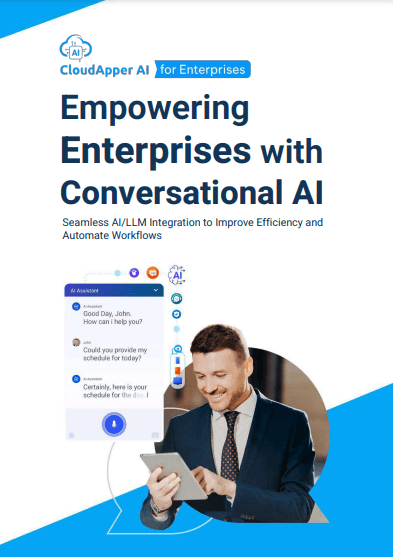
CloudApper AI Solutions for HR



- Works with








- and more.
Similar Posts

What Experts Say About Enterprise Business Automation & Why You…

Enterprise Automation with AI: How to Streamline Your Business Operations

